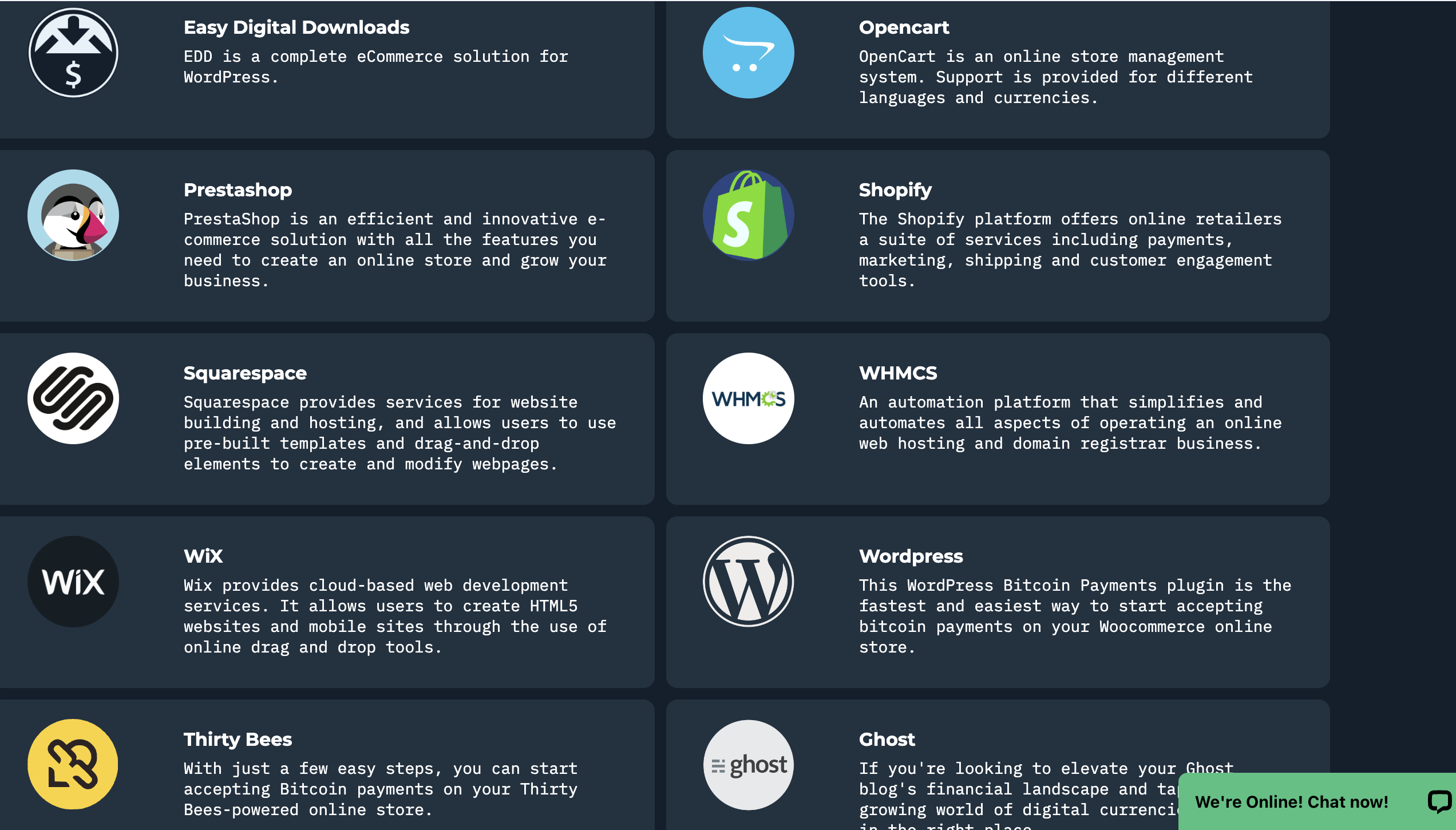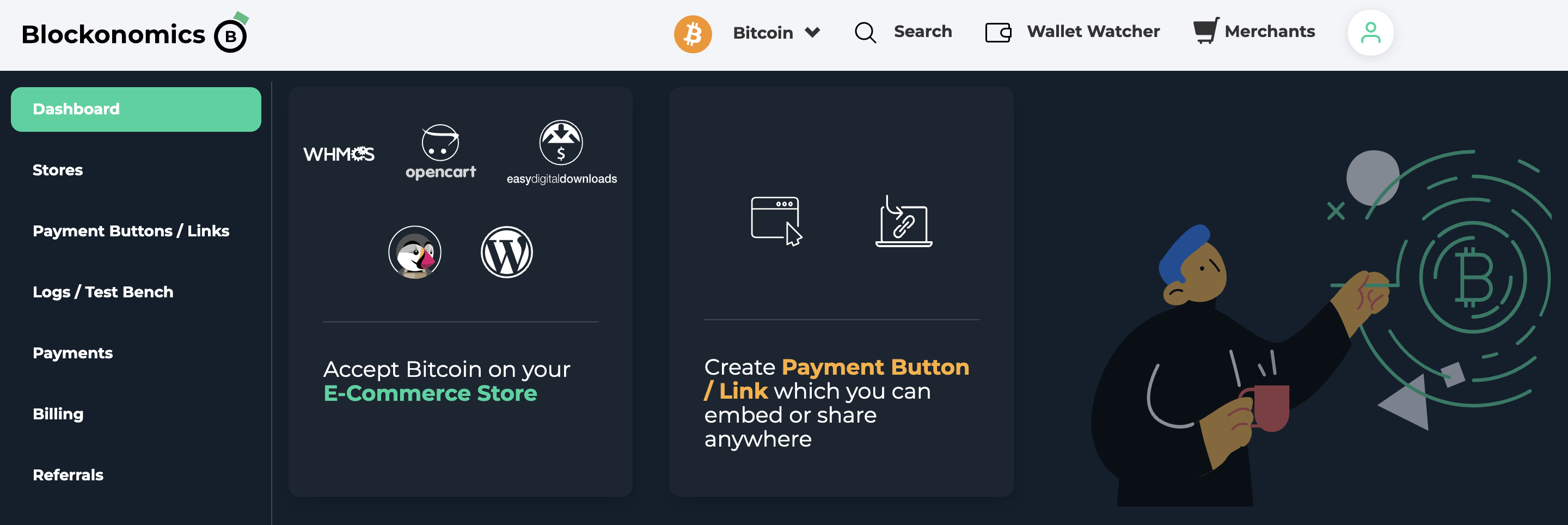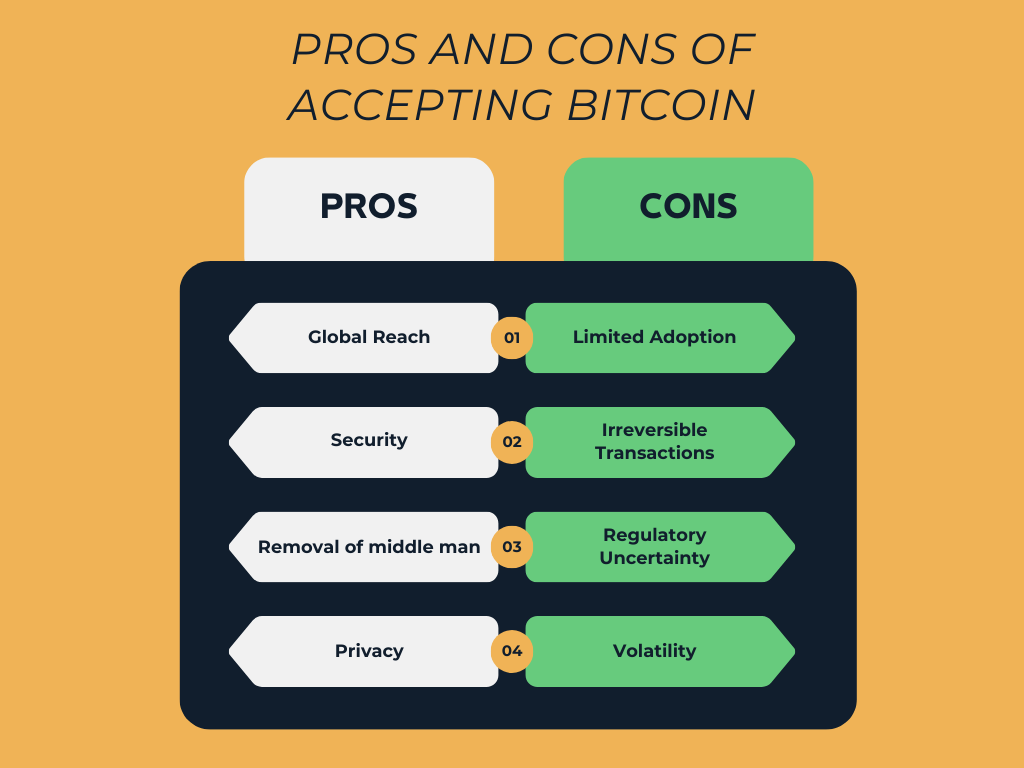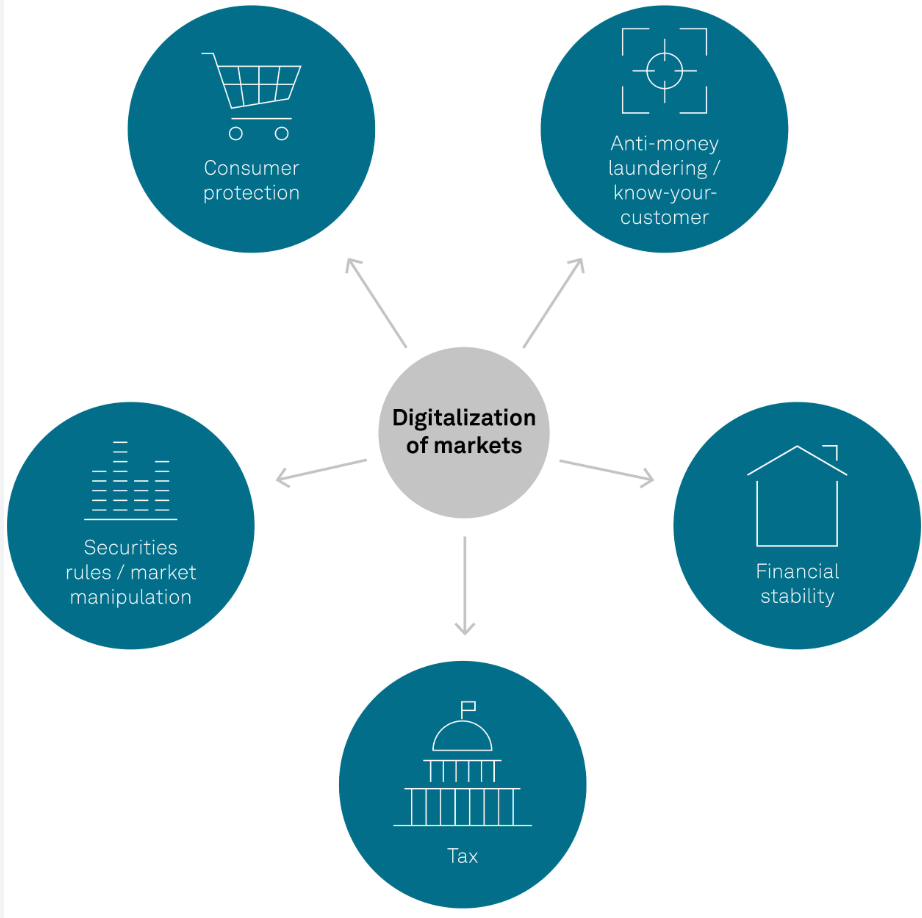How to Easily Add Bitcoin Checkout to Your Website
Simplify the process of incorporating Bitcoin payment into your website with our our easy-to-follow guide.

In online commerce, staying ahead of the curve is not just an option; it's a necessity. With digital currencies like Bitcoin becoming more mainstream by the day, integrating Bitcoin payments into your website is akin to embracing the future of online transactions. As the cryptocurrency matures, more people are gaining trust in Bitcoin as a legitimate form of payment, further driving its adoption.
In this blog, we look into the pros and cons of accepting Bitcoin and how you can easily add Bitcoin payment to your website, making your online business stay competitive.
Table of Contents
- How To Add Bitcoin Payments to Your Website
- Pros and cons of accepting Bitcoin
- Security of Bitcoin transactions
- Refunds and returns with Bitcoin payments
- Legal considerations when accepting Bitcoin
- Conclusion
- Frequently Asked Questions
How To Add Bitcoin Payments to Your Website
Here is a guide to help you get started in Bitcoin payments to your website.
Step 1: Find the right Bitcoin payment checkout
Selecting the ideal Bitcoin payment checkout is a critical step in adding Bitcoin payment to your website. Start by researching and comparing different options, considering factors like:
- Transaction fees
- Ease of integration
- Supported cryptocurrencies
- Security features
- Customer support
It's essential to choose a processor that aligns with your business needs and integrates seamlessly with your website. Some examples of payment infrastructures include Blockonomics, Coinbase, CoinGate, and BitPay. The right payment checkout provides a reliable infrastructure for you to accept Bitcoin payments, ensuring a smooth experience for both you and your customers. Blockonomics, for example, has features such as direct-to-wallet. This enhances security since Blockonomics does not hold any of your funds but instead, any Bitcoin your customers send go directly to the wallet you provided.
Step 2: Integrate a Bitcoin payment Infrastructure into your Website

Once you've chosen a Bitcoin payment checkout that suits your needs, the next step is to seamlessly integrate it into your website. Most payment infrastructures offer clear and detailed integration guides or plugins for popular e-commerce platforms like WordPress, Shopify, and Magento.
Typically, this involves registering with the processor, obtaining API keys, and customizing the checkout process on your website. You can add Bitcoin payment buttons, QR codes, or payment forms to your checkout page, allowing customers to choose Bitcoin as a payment option.

Thoroughly test the integration in a sandbox or testnet environment to confirm that payments are processed correctly before going live. By following these steps, you can smoothly integrate a Bitcoin payment checkout into your website, offering your customers a secure and convenient way to transact with Bitcoin.
Step 3: Configuring Your Bitcoin Payment Checkout
Once you've integrated a Bitcoin payment checkout into your website, the next crucial step is configuring it to work seamlessly with your online store or platform. This involves fine-tuning settings to ensure a smooth payment experience for your customers.
You may need to specify details such as accepted cryptocurrencies (Bitcoin, Bitcoin Cash, etc.), transaction confirmation settings, and currency conversion options if applicable. Ensure that your checkout process displays Bitcoin as a payment option and provides real-time exchange rates.
Additionally, you should configure notification and confirmation settings so that both you and your customers receive timely updates on successful transactions. By meticulously configuring your Bitcoin payment infrastructure, you can offer a hassle-free and reliable payment method that enhances your website's navigation and customer satisfaction.
Pros and Cons of Accepting Bitcoin

Understanding the pros and cons when you accept Bitcoin payments is essential for any business considering its integration. Here’s a breakdown of the advantages and drawbacks of accepting Bitcoin to your website.
Pros:
- Global Reach: Bitcoin enables you to reach customers worldwide without needing currency conversion, expanding your potential customer base. It can easily be accessed and used by anyone with an internet connection.
- Security: Bitcoin uses cryptographic techniques to secure transactions. Each transaction is encrypted and must be verified by the network. Additionally, Bitcoin operates on a decentralized public ledger called the blockchain. This ledger records all transactions made with Bitcoin and is maintained by a network of nodes (computers), rather than a centralized authority like a bank. The blockchain technology behind Bitcoin provides robust security, reducing the risk of fraud and chargebacks.
- Removal of the middle man: Bitcoin operates independently of central banks or governments, offering a decentralized alternative to traditional finance. It removes the need for banks as middlemen by allowing direct, peer-to-peer transactions that are secured and verified through cryptography.
- Privacy: Bitcoin offers a level of privacy as transactions do not require personal information, enhancing customer data protection. According to a study by Cisco, 86% of users care about privacy and want more control, a concept that the anonymous nature of Bitcoin provides
Cons:
- Volatility: Bitcoin's volatility is partly due to its relatively small market size, speculative trading, and the evolving regulatory landscape. As a result, while some investors see Bitcoin's high price movements as an opportunity for substantial returns, others may find it less suitable for use as a stable store of value or medium of exchange. It's important to note that while Bitcoin's price fluctuations can be significant, they are a common characteristic of many emerging and innovative technologies in their early stages of adoption.
- Limited Adoption: While Bitcoin has gained significant attention and use in certain sectors and regions, it is not universally accepted as a medium of exchange. This limitation is partly due to its volatility, regulatory uncertainties, and a lack of understanding or trust in digital currencies among the general public and businesses. However, Bitcoin is still a relatively new and evolving technology, and its adoption rate could change as the technology matures and becomes more integrated into mainstream financial systems and mass awareness of its use spreads even more.
- Regulatory Uncertainty: This uncertainty arises because different countries and regulatory bodies have varying approaches to digital currencies. For businesses and individuals, this inconsistency can lead to confusion and hesitation in adopting Bitcoin. As governments and financial authorities continue to study and understand Bitcoin, clearer and more consistent regulatory frameworks are likely to emerge, potentially paving the way for greater stability and wider adoption in the long term.
- Irreversible Transactions: Once a Bitcoin transaction is confirmed on the blockchain, it cannot be reversed. This characteristic, while providing security against fraud and chargebacks, can also be a double-edged sword. In cases of mistaken addresses, scams, or unauthorized transfers, the lack of a reversal mechanism will require additional policies and efforts to help prevent or mitigate such occurrences.
Security of Bitcoin transactions
Ensuring the security of Bitcoin transactions is paramount to protect both your business and your customers. The following security measures can minimize the risks associated with Bitcoin transactions and provide peace of mind to both your business and your customers.
1. Use Secure Wallets:
- Select reputable Bitcoin wallets that offer robust security features, preferably hardware wallets, like Electrum or Trezor, which are highly secure options. Additionally, ensure wallet software is kept up to date to patch any vulnerabilities.
2. Enable Two-Factor Authentication (2FA):
- Activate 2FA for your Bitcoin wallet and any accounts associated with your payment checkout. This adds an extra layer of security, requiring a second verification step in addition to your password.
3. Educate Your Team:
- Train your staff about Bitcoin security best practices. Ensure they can recognize common threats like phishing attempts.
4. Use Multi-Signature Wallets:
- Consider using multi-signature wallets that require multiple private keys to authorize a transaction. This reduces the risk of unauthorized access or fraud.
5. Regularly Audit Transactions:
- Keep a close eye on your Bitcoin transactions. Regularly audit and reconcile your records to identify any discrepancies or suspicious activity.
6. Use Cold Storage:
- For long-term storage of Bitcoin funds, consider cold storage solutions. These are offline wallets that are less susceptible to hacking.

7. Keep Private Keys Secure:
- Guard your private keys with the utmost care. Make sure to store them offline, preferably in a secure physical location.
8. Use Reputable Payment Infrastructures:
- Choose established and reputable Bitcoin payment checkouts that prioritize security, mainly direct-to-wallet processors such as Blockonomics.
9. Implement Strong Encryption:
- Encrypt sensitive data and communications related to Bitcoin transactions. This includes using SSL certificates for your website.
10. Educate Your Customers:
- Educate your customers about Bitcoin security, emphasizing the importance of secure wallets and practices.
Refunds and returns with Bitcoin payments
Handling refunds and returns with Bitcoin payments requires a thoughtful approach to maintaining customer satisfaction and managing financial transactions effectively. First, clearly define your refund and return policy on your website, specifying the conditions and timeframes under which customers can request them.
When a customer initiates a return or requests a refund, communicate promptly and let them provide you with a Bitcoin address where the funds can be returned. Ensure that the refund amount accurately reflects the current Bitcoin exchange rate to avoid disputes.
Keep thorough records of all Bitcoin transactions, including refunds, for accounting and customer service purposes. If your Bitcoin payment checkout supports it, you can automate the refund process, making it more efficient.
Regulatory considerations when accepting Bitcoin

When you accept Bitcoin payments on your website, this will involve several legal and regulatory considerations. First, it's crucial to be aware of the cryptocurrency regulations in your jurisdiction, as they can vary widely from one place to another. You can start ensuring compliance with the following:
- Anti-money laundering (AML)
- Know Your Customer (KYC) requirements, which may necessitate collecting and verifying customer information for larger transactions.
- Customer Due Diligence (CDD) checks
Keep thorough records of all Bitcoin transactions for tax purposes, as cryptocurrencies are often subject to capital gains tax or other forms of taxation. Additionally, be prepared for potential changes in regulations, as governments are still formulating their approaches to cryptocurrency.
In light of this, consulting with legal experts who specialize in cryptocurrency and staying informed about regulatory developments is important to ensure your business operates within the bounds of the law when accepting Bitcoin payments.
Conclusion
Adding Bitcoin payment functionality to your website can be a valuable addition to your business. By understanding the basics, selecting the right payment checkout, and following the steps for integration, you can provide your customers with a secure and convenient payment option.
Moreover, Bitcoin's decentralized nature and cryptographic security make it a robust choice for online transactions. As the world of finance continues to evolve, integrating Bitcoin into your website positions your business to thrive in an increasingly digital and interconnected global economy. You can now start accepting Bitcoin payments today with Blockonomics, in less than ten minutes, using our plugins or API integration.
FAQ
Why should I consider adding Bitcoin payment to my website?
Adding Bitcoin payment to your website can offer several advantages. It expands your customer base globally, as Bitcoin transcends geographical boundaries and eliminates currency conversion hassles. Embracing Bitcoin also positions your business as forward-thinking, potentially attracting a new audience interested in cryptocurrency.
Is it safe to accept Bitcoin payments on my website?
Accepting Bitcoin payments on your website can be safe if you follow security best practices. Use reputable payment checkouts such as Blockonomics, and secure wallets, and employ encryption to protect sensitive data. Implement two-factor authentication (2FA) and regularly update your software. Educate your team on security measures and monitor transactions for any suspicious activity. While Bitcoin is secure, ensuring proper cybersecurity measures on your website is crucial to keeping your business and customers safe.
Will I receive Bitcoin or my local currency when a customer pays?
The choice between receiving Bitcoin or your local currency when a customer pays depends on your preference and payment infrastructure. Most processors offer options for automatic conversion to your local currency, which can help mitigate Bitcoin's price volatility. However, you can also choose to receive Bitcoin directly if you wish to hold and manage cryptocurrency assets. Selecting your preferred option when setting up your payment infrastructure is essential.
What if the price of Bitcoin is volatile?
Bitcoin volatility can affect the value of payments received. To mitigate this, some businesses choose to use payment checkouts that instantly convert Bitcoin payments to their local currency, reducing exposure to Bitcoin's price fluctuations. Alternatively, you can also hold onto Bitcoin as an investment. It's essential to communicate your approach clearly in your payment policies to manage customer expectations.
Further Reading
Top 3 Bitcoin Wallets to Watch Out for in 2024
Crypto Payments in Emerging Economies: Case Studies and Impacts




Comments ()